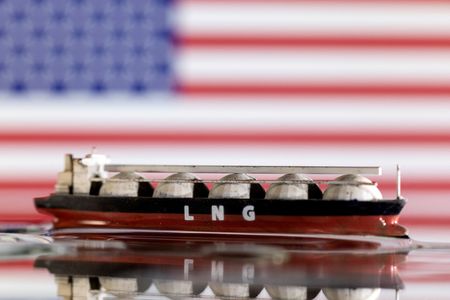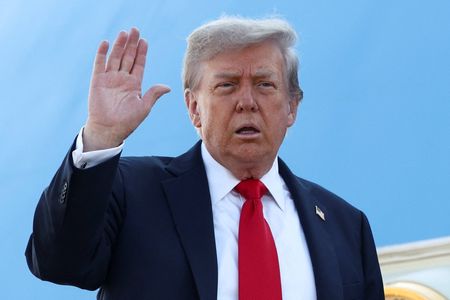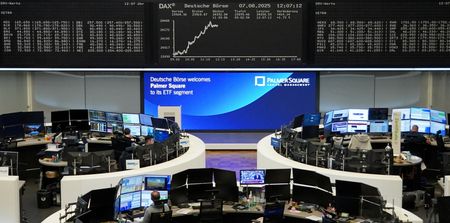By Curtis Williams
HOUSTON (Reuters) – President Donald Trump’s emerging trade war with Beijing poses a new threat to billions of dollars in planned U.S. liquefied natural gas export projects, many of which rely on China as a key buyer, according to analysts, industry sources, and company filings.
The threat reflects the double-edged nature of Trump’s protectionist policies, which are intended to boost U.S. business and force action to stop drug trafficking and illegal immigration, but could also inadvertently undermine his hopes of vastly expanding U.S. energy output.
“The tariffs may impact long-term contracting and offtake agreements…and make it more difficult for new US LNG projects to progress toward Final Investment Decisions,” analysts at energy consulting firm EBW Analytics told customers in a note on Tuesday, referring to Beijing’s decision to impose retaliatory levies on U.S. energy imports.
Trump over the weekend announced a 10% tariff on Chinese imports as part of a broad plan to improve the U.S. trade balance, triggering retaliation from Beijing which slapped a 15% tariff on U.S. LNG and coal, and a 10% tariff on U.S. oil.
The U.S. is the world’s largest exporter of LNG and China has been a major buyer of the super-chilled gas, importing nearly 6%, or about 4.3 million metric tonnes, of total U.S. LNG exports last year, according to LSEG data.
Chinese state-owned companies have signed LNG supply deals for over 20 million metric tonnes per annum (MTPA) from both existing and future U.S. export terminals, according to Reuters calculations.
The two largest U.S. LNG exporters, Venture Global LNG and Cheniere, have 14 million MTPA in agreed long-term contracts with Chinese companies, according to their public announcements.
Venture Global declined to respond to requests for comment, while Cheniere and rival Energy Transfer, which has a long-term sales and purchase agreement with China, were not immediately available for comment.
Freeport LNG, the third-largest U.S. LNG exporter, also declined to comment.
There are eight LNG export terminals operating in the U.S., three under construction and almost 20 more at various stages of development.
Companies are pushing ahead with projects for new or expanded LNG export capacity after the Trump administration in January lifted a moratorium on new LNG export permits, imposed by former President Joe Biden over concerns about the projects’ environmental and economic impacts.
But Charlie Riedl, the Executive Director of the Center for LNG, a trade group representing many U.S. LNG exporters and developers, said China’s decision to impose tariffs injects uncertainty into the industry and weakens America’s competitive position in global energy markets.
“These tariffs on U.S. LNG directly undermine the Trump administration’s efforts to expand American energy exports and strengthen our geopolitical influence,” Riedl said.
A White House official told Reuters that Chinese tariffs on U.S. LNG could have limited economic impact, but said the risk is worthwhile.
“There is not a dollar value you can put on saving American lives from fentanyl deaths,” the official said, reflecting U.S. concerns that China is a major source of the drug and chemicals used to make it.
Trump wants to expand the export markets for LNG to other nations as well, creating less risk from any Chinese actions, the official said.
BIG CONTRACTS
LNG developers use long-term contracts or sales and purchase agreements to help secure funding for their projects from banks. They are a key element in moving projects from the development stage to a final investment decision.
Venture Global, the most valuable U.S. LNG exporter with two plants operating in Louisiana and three more under development, has signed 9.5 MTPA in supply deals with Chinese companies so far, according to company filings.
Cheniere Energy, the second-most valuable U.S. LNG company and currently the largest exporter, has more than 4.5 MTPA in long-term Chinese deals, according to its announcements.
As part of the prospectus for its blockbuster initial public offering in January, Venture Global warned investors of its exposure to a possible trade war between the world’s two largest economies.
“These factors could adversely affect our ability to market the remaining production capacity of our projects, which could have a material adverse effect on the viability of our projects and on our business,” Venture Global told investors at the time.
Its stock was down almost 5% in afternoon trading on Tuesday, while Cheniere was down less than 1%.
(Reporting by Curtis Williams in Houston, additional reporting by Scott DeSavino and Jarrett Renshaw; Editing Richard Valdmanis and Nia Williams)










